Apps and Privacy: An Ethics Case Study - Ethical Theories Analysis
VerifiedAdded on 2022/12/08
|6
|1821
|349
Report
AI Summary
This report presents an analysis of the "Apps and Privacy" case study, focusing on the ethical implications of social media applications, particularly concerning user data privacy. The analysis employs four classical ethical theories: Utilitarianism, Deontology, Contract theory, and Virtue theory. The report examines how the Path application's practices, specifically its use of user data without explicit consent, align with or violate these ethical frameworks. It explores the consequences of these actions, such as the potential for diminished user trust and the violation of privacy. The analysis concludes by offering recommendations for the founder of Path, emphasizing the importance of adhering to established guidelines, implementing security measures to protect user data, and the role of government and users in safeguarding privacy. The report underscores the need for ethical considerations in the development and operation of social media platforms to protect user rights and maintain public trust.

IT Ethics
Paraphrase This Document
Need a fresh take? Get an instant paraphrase of this document with our AI Paraphraser
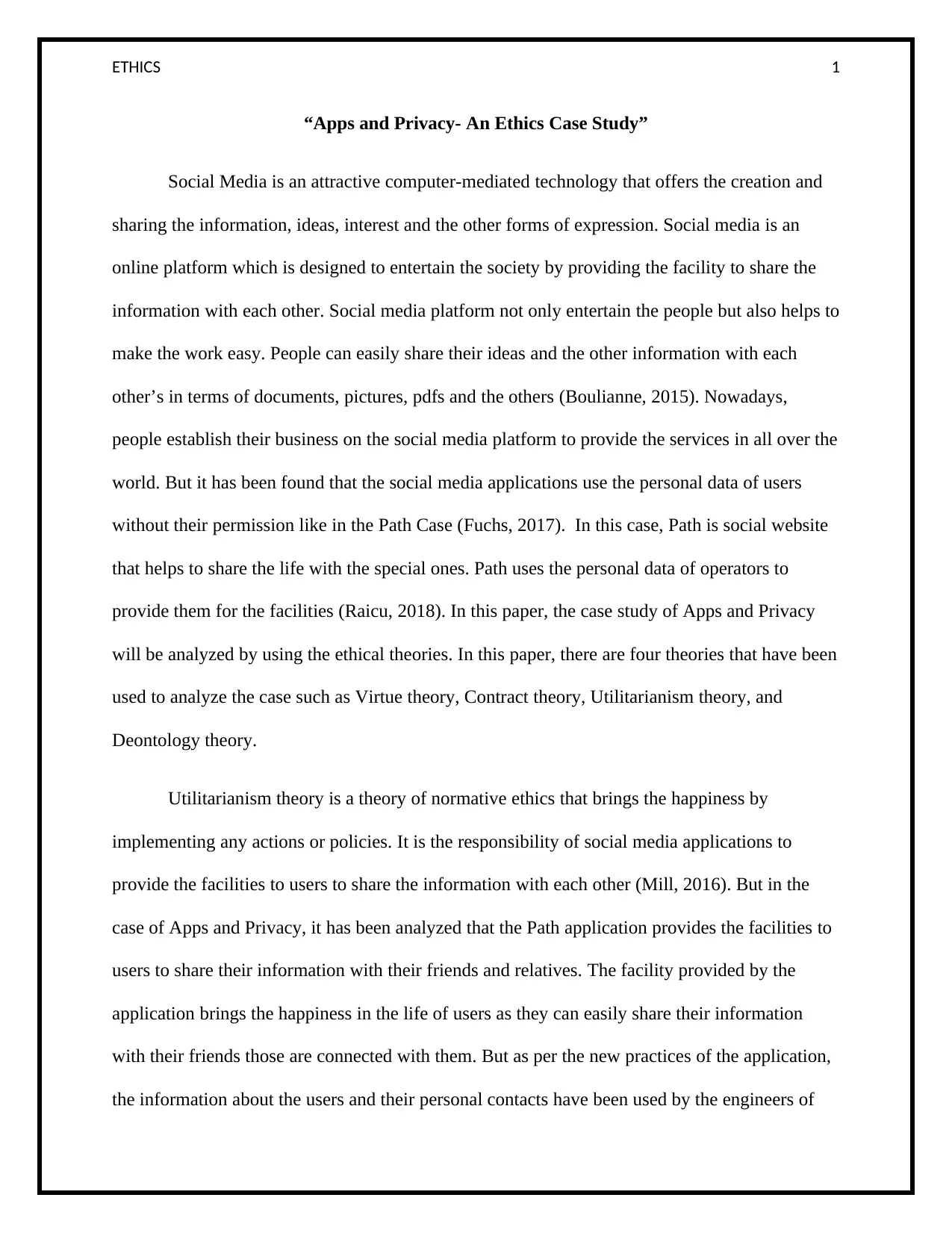
ETHICS 1
“Apps and Privacy- An Ethics Case Study”
Social Media is an attractive computer-mediated technology that offers the creation and
sharing the information, ideas, interest and the other forms of expression. Social media is an
online platform which is designed to entertain the society by providing the facility to share the
information with each other. Social media platform not only entertain the people but also helps to
make the work easy. People can easily share their ideas and the other information with each
other’s in terms of documents, pictures, pdfs and the others (Boulianne, 2015). Nowadays,
people establish their business on the social media platform to provide the services in all over the
world. But it has been found that the social media applications use the personal data of users
without their permission like in the Path Case (Fuchs, 2017). In this case, Path is social website
that helps to share the life with the special ones. Path uses the personal data of operators to
provide them for the facilities (Raicu, 2018). In this paper, the case study of Apps and Privacy
will be analyzed by using the ethical theories. In this paper, there are four theories that have been
used to analyze the case such as Virtue theory, Contract theory, Utilitarianism theory, and
Deontology theory.
Utilitarianism theory is a theory of normative ethics that brings the happiness by
implementing any actions or policies. It is the responsibility of social media applications to
provide the facilities to users to share the information with each other (Mill, 2016). But in the
case of Apps and Privacy, it has been analyzed that the Path application provides the facilities to
users to share their information with their friends and relatives. The facility provided by the
application brings the happiness in the life of users as they can easily share their information
with their friends those are connected with them. But as per the new practices of the application,
the information about the users and their personal contacts have been used by the engineers of
“Apps and Privacy- An Ethics Case Study”
Social Media is an attractive computer-mediated technology that offers the creation and
sharing the information, ideas, interest and the other forms of expression. Social media is an
online platform which is designed to entertain the society by providing the facility to share the
information with each other. Social media platform not only entertain the people but also helps to
make the work easy. People can easily share their ideas and the other information with each
other’s in terms of documents, pictures, pdfs and the others (Boulianne, 2015). Nowadays,
people establish their business on the social media platform to provide the services in all over the
world. But it has been found that the social media applications use the personal data of users
without their permission like in the Path Case (Fuchs, 2017). In this case, Path is social website
that helps to share the life with the special ones. Path uses the personal data of operators to
provide them for the facilities (Raicu, 2018). In this paper, the case study of Apps and Privacy
will be analyzed by using the ethical theories. In this paper, there are four theories that have been
used to analyze the case such as Virtue theory, Contract theory, Utilitarianism theory, and
Deontology theory.
Utilitarianism theory is a theory of normative ethics that brings the happiness by
implementing any actions or policies. It is the responsibility of social media applications to
provide the facilities to users to share the information with each other (Mill, 2016). But in the
case of Apps and Privacy, it has been analyzed that the Path application provides the facilities to
users to share their information with their friends and relatives. The facility provided by the
application brings the happiness in the life of users as they can easily share their information
with their friends those are connected with them. But as per the new practices of the application,
the information about the users and their personal contacts have been used by the engineers of
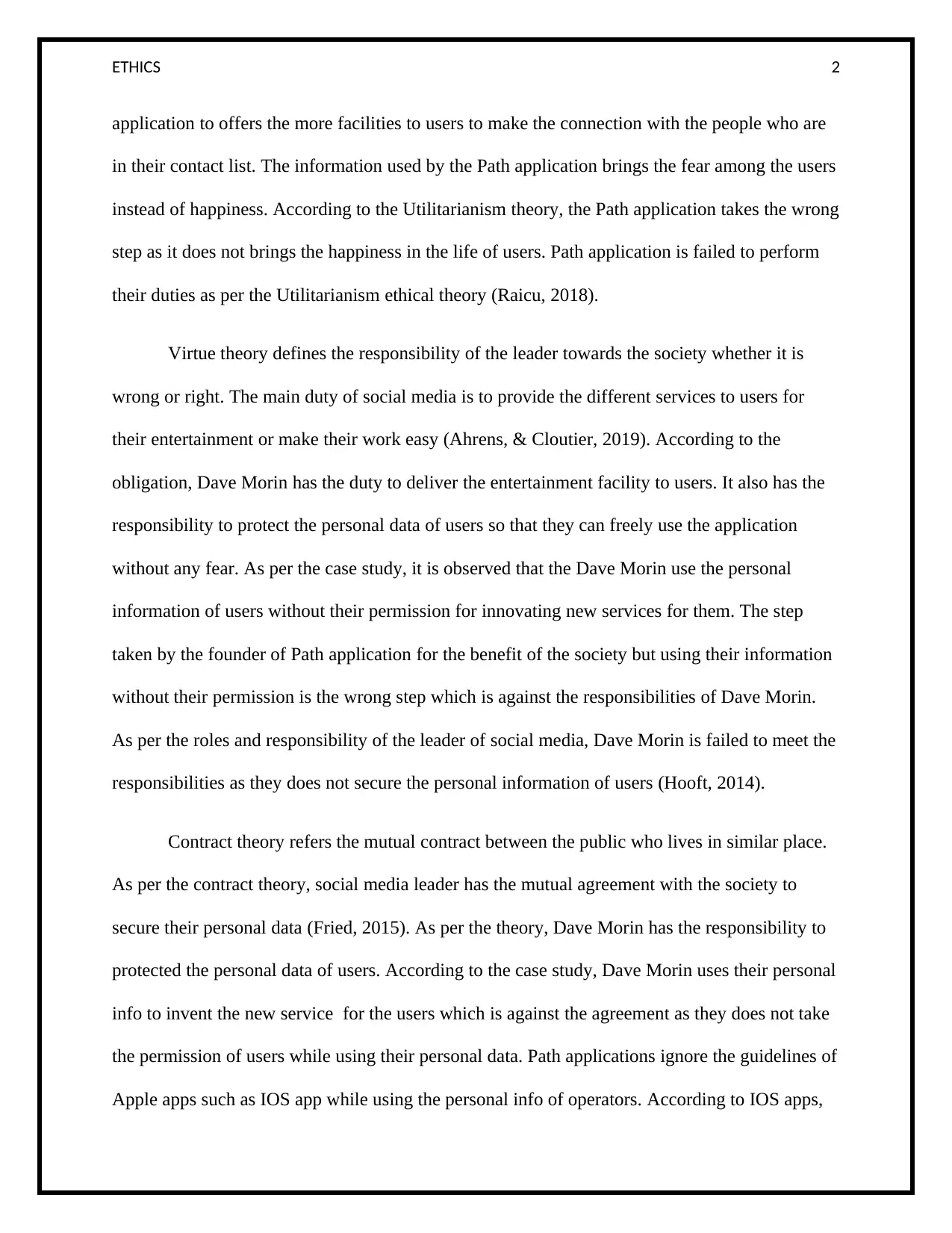
ETHICS 2
application to offers the more facilities to users to make the connection with the people who are
in their contact list. The information used by the Path application brings the fear among the users
instead of happiness. According to the Utilitarianism theory, the Path application takes the wrong
step as it does not brings the happiness in the life of users. Path application is failed to perform
their duties as per the Utilitarianism ethical theory (Raicu, 2018).
Virtue theory defines the responsibility of the leader towards the society whether it is
wrong or right. The main duty of social media is to provide the different services to users for
their entertainment or make their work easy (Ahrens, & Cloutier, 2019). According to the
obligation, Dave Morin has the duty to deliver the entertainment facility to users. It also has the
responsibility to protect the personal data of users so that they can freely use the application
without any fear. As per the case study, it is observed that the Dave Morin use the personal
information of users without their permission for innovating new services for them. The step
taken by the founder of Path application for the benefit of the society but using their information
without their permission is the wrong step which is against the responsibilities of Dave Morin.
As per the roles and responsibility of the leader of social media, Dave Morin is failed to meet the
responsibilities as they does not secure the personal information of users (Hooft, 2014).
Contract theory refers the mutual contract between the public who lives in similar place.
As per the contract theory, social media leader has the mutual agreement with the society to
secure their personal data (Fried, 2015). As per the theory, Dave Morin has the responsibility to
protected the personal data of users. According to the case study, Dave Morin uses their personal
info to invent the new service for the users which is against the agreement as they does not take
the permission of users while using their personal data. Path applications ignore the guidelines of
Apple apps such as IOS app while using the personal info of operators. According to IOS apps,
application to offers the more facilities to users to make the connection with the people who are
in their contact list. The information used by the Path application brings the fear among the users
instead of happiness. According to the Utilitarianism theory, the Path application takes the wrong
step as it does not brings the happiness in the life of users. Path application is failed to perform
their duties as per the Utilitarianism ethical theory (Raicu, 2018).
Virtue theory defines the responsibility of the leader towards the society whether it is
wrong or right. The main duty of social media is to provide the different services to users for
their entertainment or make their work easy (Ahrens, & Cloutier, 2019). According to the
obligation, Dave Morin has the duty to deliver the entertainment facility to users. It also has the
responsibility to protect the personal data of users so that they can freely use the application
without any fear. As per the case study, it is observed that the Dave Morin use the personal
information of users without their permission for innovating new services for them. The step
taken by the founder of Path application for the benefit of the society but using their information
without their permission is the wrong step which is against the responsibilities of Dave Morin.
As per the roles and responsibility of the leader of social media, Dave Morin is failed to meet the
responsibilities as they does not secure the personal information of users (Hooft, 2014).
Contract theory refers the mutual contract between the public who lives in similar place.
As per the contract theory, social media leader has the mutual agreement with the society to
secure their personal data (Fried, 2015). As per the theory, Dave Morin has the responsibility to
protected the personal data of users. According to the case study, Dave Morin uses their personal
info to invent the new service for the users which is against the agreement as they does not take
the permission of users while using their personal data. Path applications ignore the guidelines of
Apple apps such as IOS app while using the personal info of operators. According to IOS apps,
⊘ This is a preview!⊘
Do you want full access?
Subscribe today to unlock all pages.

Trusted by 1+ million students worldwide
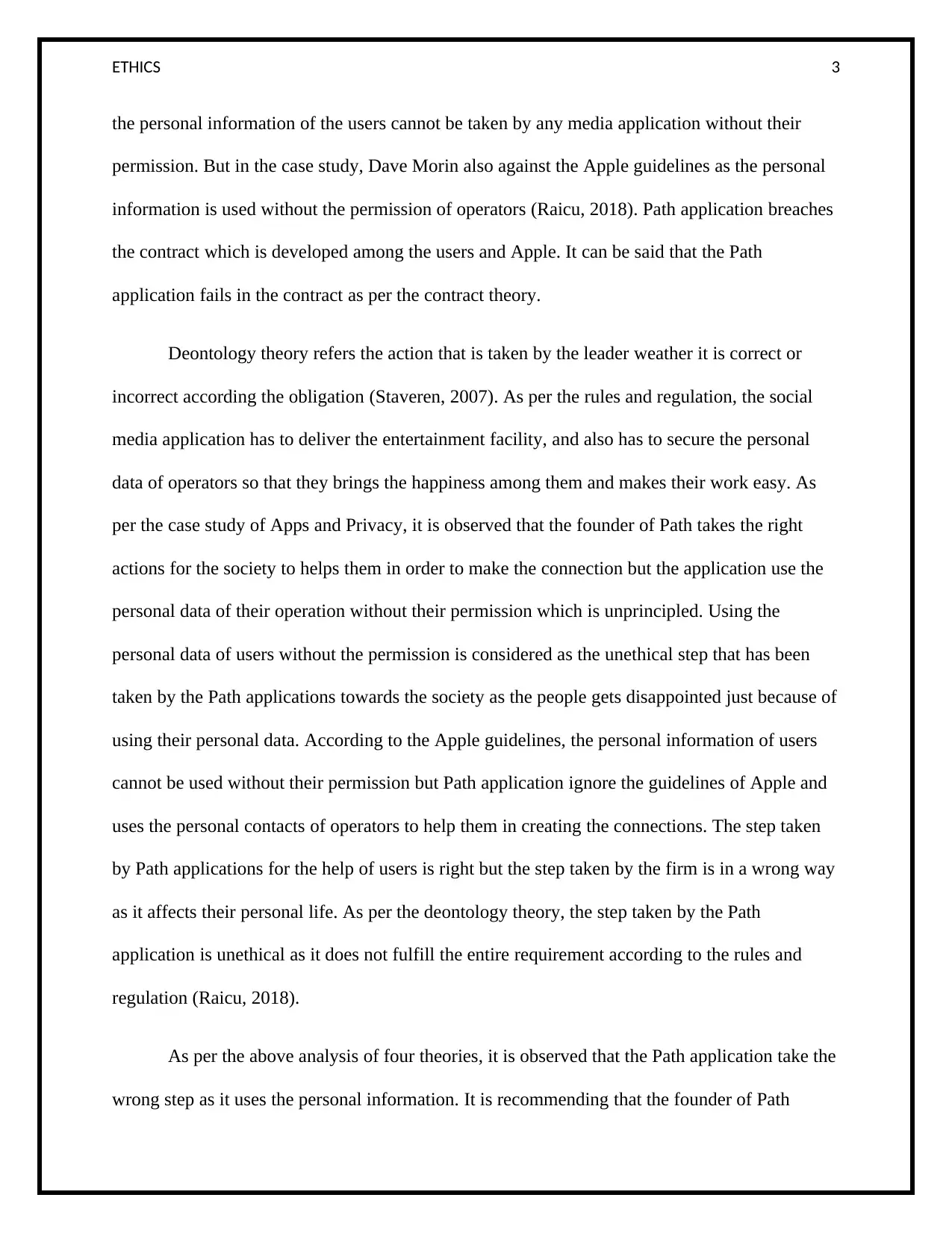
ETHICS 3
the personal information of the users cannot be taken by any media application without their
permission. But in the case study, Dave Morin also against the Apple guidelines as the personal
information is used without the permission of operators (Raicu, 2018). Path application breaches
the contract which is developed among the users and Apple. It can be said that the Path
application fails in the contract as per the contract theory.
Deontology theory refers the action that is taken by the leader weather it is correct or
incorrect according the obligation (Staveren, 2007). As per the rules and regulation, the social
media application has to deliver the entertainment facility, and also has to secure the personal
data of operators so that they brings the happiness among them and makes their work easy. As
per the case study of Apps and Privacy, it is observed that the founder of Path takes the right
actions for the society to helps them in order to make the connection but the application use the
personal data of their operation without their permission which is unprincipled. Using the
personal data of users without the permission is considered as the unethical step that has been
taken by the Path applications towards the society as the people gets disappointed just because of
using their personal data. According to the Apple guidelines, the personal information of users
cannot be used without their permission but Path application ignore the guidelines of Apple and
uses the personal contacts of operators to help them in creating the connections. The step taken
by Path applications for the help of users is right but the step taken by the firm is in a wrong way
as it affects their personal life. As per the deontology theory, the step taken by the Path
application is unethical as it does not fulfill the entire requirement according to the rules and
regulation (Raicu, 2018).
As per the above analysis of four theories, it is observed that the Path application take the
wrong step as it uses the personal information. It is recommending that the founder of Path
the personal information of the users cannot be taken by any media application without their
permission. But in the case study, Dave Morin also against the Apple guidelines as the personal
information is used without the permission of operators (Raicu, 2018). Path application breaches
the contract which is developed among the users and Apple. It can be said that the Path
application fails in the contract as per the contract theory.
Deontology theory refers the action that is taken by the leader weather it is correct or
incorrect according the obligation (Staveren, 2007). As per the rules and regulation, the social
media application has to deliver the entertainment facility, and also has to secure the personal
data of operators so that they brings the happiness among them and makes their work easy. As
per the case study of Apps and Privacy, it is observed that the founder of Path takes the right
actions for the society to helps them in order to make the connection but the application use the
personal data of their operation without their permission which is unprincipled. Using the
personal data of users without the permission is considered as the unethical step that has been
taken by the Path applications towards the society as the people gets disappointed just because of
using their personal data. According to the Apple guidelines, the personal information of users
cannot be used without their permission but Path application ignore the guidelines of Apple and
uses the personal contacts of operators to help them in creating the connections. The step taken
by Path applications for the help of users is right but the step taken by the firm is in a wrong way
as it affects their personal life. As per the deontology theory, the step taken by the Path
application is unethical as it does not fulfill the entire requirement according to the rules and
regulation (Raicu, 2018).
As per the above analysis of four theories, it is observed that the Path application take the
wrong step as it uses the personal information. It is recommending that the founder of Path
Paraphrase This Document
Need a fresh take? Get an instant paraphrase of this document with our AI Paraphraser
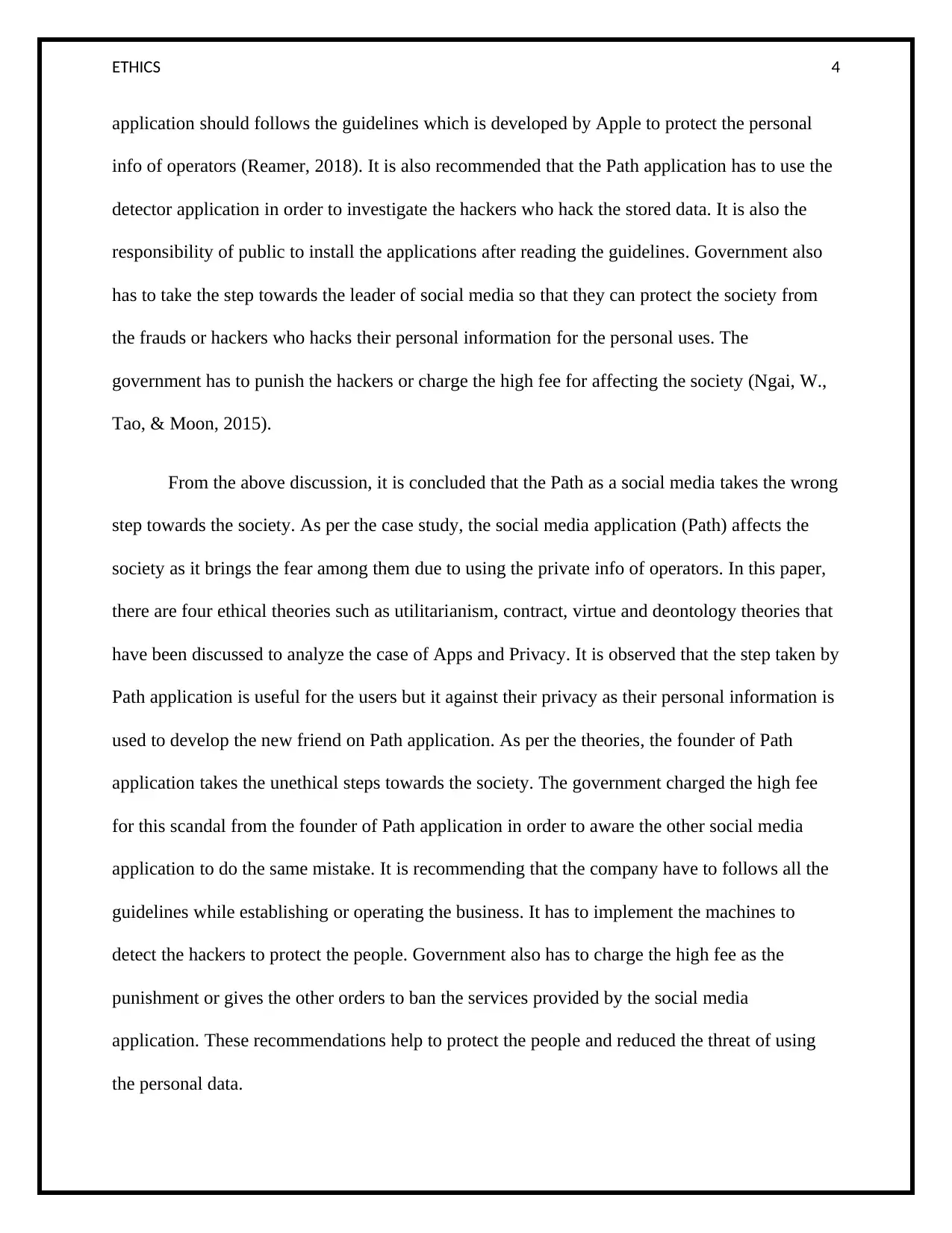
ETHICS 4
application should follows the guidelines which is developed by Apple to protect the personal
info of operators (Reamer, 2018). It is also recommended that the Path application has to use the
detector application in order to investigate the hackers who hack the stored data. It is also the
responsibility of public to install the applications after reading the guidelines. Government also
has to take the step towards the leader of social media so that they can protect the society from
the frauds or hackers who hacks their personal information for the personal uses. The
government has to punish the hackers or charge the high fee for affecting the society (Ngai, W.,
Tao, & Moon, 2015).
From the above discussion, it is concluded that the Path as a social media takes the wrong
step towards the society. As per the case study, the social media application (Path) affects the
society as it brings the fear among them due to using the private info of operators. In this paper,
there are four ethical theories such as utilitarianism, contract, virtue and deontology theories that
have been discussed to analyze the case of Apps and Privacy. It is observed that the step taken by
Path application is useful for the users but it against their privacy as their personal information is
used to develop the new friend on Path application. As per the theories, the founder of Path
application takes the unethical steps towards the society. The government charged the high fee
for this scandal from the founder of Path application in order to aware the other social media
application to do the same mistake. It is recommending that the company have to follows all the
guidelines while establishing or operating the business. It has to implement the machines to
detect the hackers to protect the people. Government also has to charge the high fee as the
punishment or gives the other orders to ban the services provided by the social media
application. These recommendations help to protect the people and reduced the threat of using
the personal data.
application should follows the guidelines which is developed by Apple to protect the personal
info of operators (Reamer, 2018). It is also recommended that the Path application has to use the
detector application in order to investigate the hackers who hack the stored data. It is also the
responsibility of public to install the applications after reading the guidelines. Government also
has to take the step towards the leader of social media so that they can protect the society from
the frauds or hackers who hacks their personal information for the personal uses. The
government has to punish the hackers or charge the high fee for affecting the society (Ngai, W.,
Tao, & Moon, 2015).
From the above discussion, it is concluded that the Path as a social media takes the wrong
step towards the society. As per the case study, the social media application (Path) affects the
society as it brings the fear among them due to using the private info of operators. In this paper,
there are four ethical theories such as utilitarianism, contract, virtue and deontology theories that
have been discussed to analyze the case of Apps and Privacy. It is observed that the step taken by
Path application is useful for the users but it against their privacy as their personal information is
used to develop the new friend on Path application. As per the theories, the founder of Path
application takes the unethical steps towards the society. The government charged the high fee
for this scandal from the founder of Path application in order to aware the other social media
application to do the same mistake. It is recommending that the company have to follows all the
guidelines while establishing or operating the business. It has to implement the machines to
detect the hackers to protect the people. Government also has to charge the high fee as the
punishment or gives the other orders to ban the services provided by the social media
application. These recommendations help to protect the people and reduced the threat of using
the personal data.
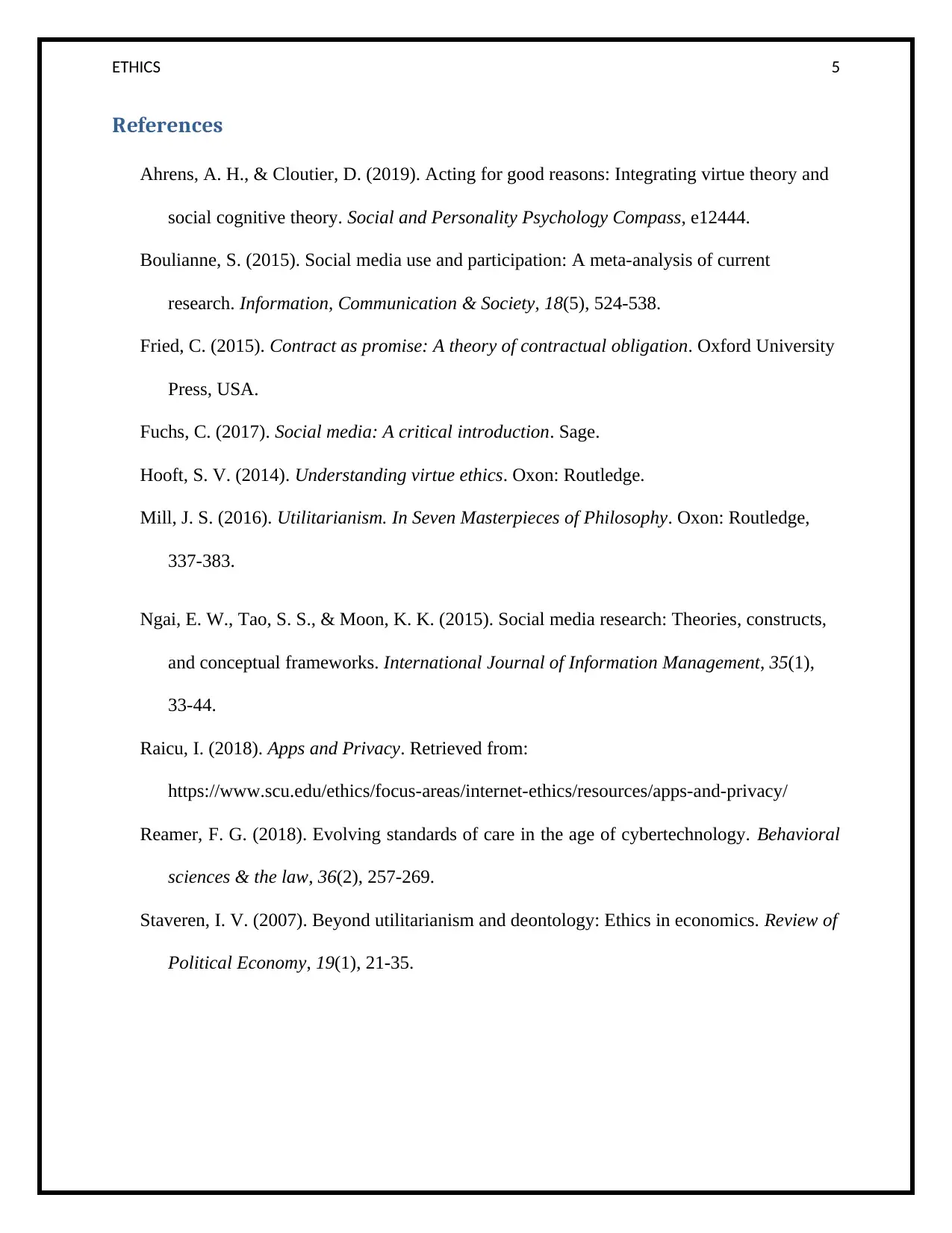
ETHICS 5
References
Ahrens, A. H., & Cloutier, D. (2019). Acting for good reasons: Integrating virtue theory and
social cognitive theory. Social and Personality Psychology Compass, e12444.
Boulianne, S. (2015). Social media use and participation: A meta-analysis of current
research. Information, Communication & Society, 18(5), 524-538.
Fried, C. (2015). Contract as promise: A theory of contractual obligation. Oxford University
Press, USA.
Fuchs, C. (2017). Social media: A critical introduction. Sage.
Hooft, S. V. (2014). Understanding virtue ethics. Oxon: Routledge.
Mill, J. S. (2016). Utilitarianism. In Seven Masterpieces of Philosophy. Oxon: Routledge,
337-383.
Ngai, E. W., Tao, S. S., & Moon, K. K. (2015). Social media research: Theories, constructs,
and conceptual frameworks. International Journal of Information Management, 35(1),
33-44.
Raicu, I. (2018). Apps and Privacy. Retrieved from:
https://www.scu.edu/ethics/focus-areas/internet-ethics/resources/apps-and-privacy/
Reamer, F. G. (2018). Evolving standards of care in the age of cybertechnology. Behavioral
sciences & the law, 36(2), 257-269.
Staveren, I. V. (2007). Beyond utilitarianism and deontology: Ethics in economics. Review of
Political Economy, 19(1), 21-35.
References
Ahrens, A. H., & Cloutier, D. (2019). Acting for good reasons: Integrating virtue theory and
social cognitive theory. Social and Personality Psychology Compass, e12444.
Boulianne, S. (2015). Social media use and participation: A meta-analysis of current
research. Information, Communication & Society, 18(5), 524-538.
Fried, C. (2015). Contract as promise: A theory of contractual obligation. Oxford University
Press, USA.
Fuchs, C. (2017). Social media: A critical introduction. Sage.
Hooft, S. V. (2014). Understanding virtue ethics. Oxon: Routledge.
Mill, J. S. (2016). Utilitarianism. In Seven Masterpieces of Philosophy. Oxon: Routledge,
337-383.
Ngai, E. W., Tao, S. S., & Moon, K. K. (2015). Social media research: Theories, constructs,
and conceptual frameworks. International Journal of Information Management, 35(1),
33-44.
Raicu, I. (2018). Apps and Privacy. Retrieved from:
https://www.scu.edu/ethics/focus-areas/internet-ethics/resources/apps-and-privacy/
Reamer, F. G. (2018). Evolving standards of care in the age of cybertechnology. Behavioral
sciences & the law, 36(2), 257-269.
Staveren, I. V. (2007). Beyond utilitarianism and deontology: Ethics in economics. Review of
Political Economy, 19(1), 21-35.
⊘ This is a preview!⊘
Do you want full access?
Subscribe today to unlock all pages.

Trusted by 1+ million students worldwide
1 out of 6
Related Documents
Your All-in-One AI-Powered Toolkit for Academic Success.
+13062052269
info@desklib.com
Available 24*7 on WhatsApp / Email
![[object Object]](/_next/static/media/star-bottom.7253800d.svg)
Unlock your academic potential
Copyright © 2020–2026 A2Z Services. All Rights Reserved. Developed and managed by ZUCOL.




